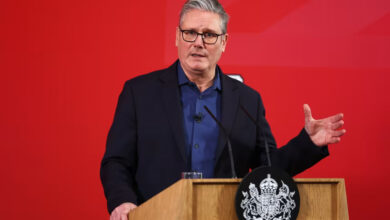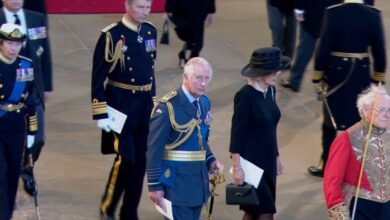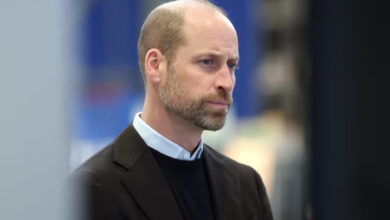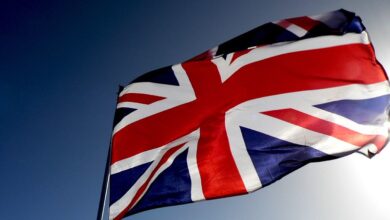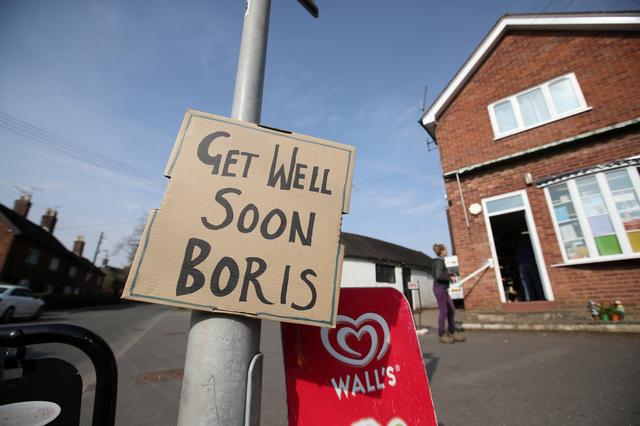
LONDON (Reuters) — Prime Minister Boris Johnson was resting in hospital on Friday, recovering from COVID-19, while his fellow Britons were told to resist the temptation of spring sunshine over Easter as the coronavirus outbreak approaches a peak.
The flamboyant 55-year-old leader’s visible decline shook the nation, but he came out of three nights of intensive care at St Thomas’ Hospital on Thursday, having been admitted after suffering from a high temperature and cough.
“The prime minister is back on a ward and continuing his recovery, which is at an early stage,” his spokesman told reporters.
“I was told he was waving his thanks to all of the nurses and doctors he saw as he was moved from the intensive care unit back to the ward. The hospital said that he was in extremely good spirits last night.”
Johnson was the first world leader to be hospitalized with the coronavirus, forcing him to hand control to foreign minister Dominic Raab just as Britain’s situation worsened drastically.
The death toll is 7,978 — the fifth highest in the world.
Despite his condition improving, it remained unclear how long Johnson would be incapacitated. His spokesman said his recovery was only just beginning and he would take advice from his medical team.
“He must rest up,” his father, Stanley Johnson, told BBC radio. “You cannot walk away from this and go straight back to Downing Street and pick up the reins without a period of readjustment.”
Johnson’s pregnant fiancee, Carrie Symonds, who has also had coronavirus symptoms, tweeted a rainbow picture — in support of healthcare workers — along with hand-clapping emojis.
Lengthy lockdown
In the prime minister’s absence, the government must consider if and when it can end Britain’s lockdown, though Raab on Thursday said it was too early to make a decision because the country had not yet reached the peak of the outbreak.
The government says it will have a better idea by next week of whether the lockdown has succeeded in reducing coronavirus infections and hospital admissions.
“We’ve started already to see plateauing,” said epidemiologist Neil Ferguson, a professor at Imperial College in London, who has helped to shape the official response.
It will take several more days for the pace of deaths to drop and more weeks to draw definitive conclusions that could allow restrictions to be lifted, he added to BBC radio.
Britain is enduring its third week of stringent restrictions, during which police have assumed new powers to fine people who stray too far or too long from home unless on essential work or seeking food and medicines.
With the start of a four-day Easter holiday greeted by glorious sunshine, authorities were on the lookout for those tempted out to see family and friends, potentially jeopardizing the impact of the lockdown.
Scotland’s chief medical officer has already resigned after flouting her own advice to stay at home, and a senior minister was under pressure on Friday after newspapers said he traveled to a second home outside London and visited his parents.
“For clarity — my parents asked me to deliver some essentials — including medicines,” housing minister Robert Jenrick tweeted in defense, adding that he had left London to return to his family home.
“We are confident that he complied with the social distancing rules,” Johnson’s spokesman said.
The prime minister’s father, Stanley, said his son’s illness would serve as a lesson for the public.
“If it can hit the prime minister, for heaven’s sake, well it does come close to home,” he said.
___
By: Michael Holden, Elizabeth Piper
Reporting by Michael Holden; Editing by Andrew Cawthorne and David Goodman
Image: A sign of support for British Prime Minister Boris Johnson, who has been in hospital since Monday as the spread of the coronavirus disease (COVID-19) continues, in Swynnerton, Britain, April 9, 2020. (REUTERS/Carl Recine)

